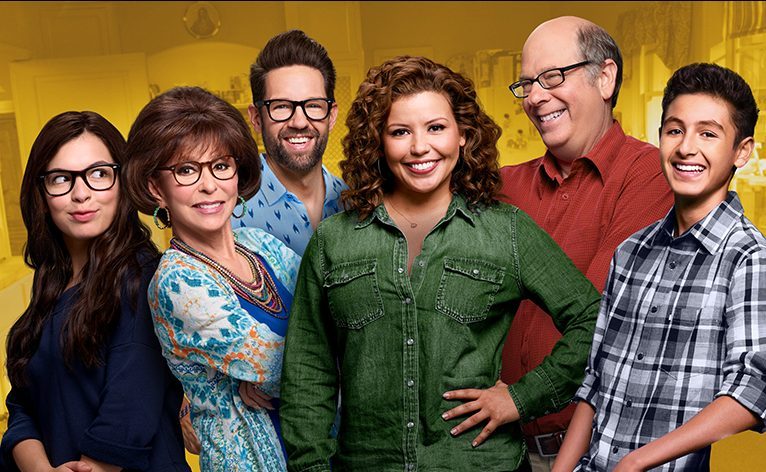Never let it be said that March 2020 brought only bad news. Yes, pretty much everything is terrifying—not that it isn’t always in some way—but the resurrected “One Day at a Time” has returned to television and that is nothing but good. The network is new (and Netflix, which canceled this gem after three wonderful seasons, gets a shady little shout-out in the premiere’s opening moments), but despite the switch to Pop, the soul of the show remains the same. Gloria Calderon Kellett and Mike Royce’s heartfelt, refreshingly frank remake of Norman Lear’s sitcom sacrifices none of that frankness now that it’s moved on from the land of streaming; if anything, its presence on the network that “Schitt’s Creek” calls home is a much better fit. Even the presence of commercial breaks doesn’t diminish its charms. There is but one complaint to be made: this iteration of “One Day at a Time” can’t spare the time to include the full theme song—and while the loss of one of TV’s catchiest tunes is no small thing, it’s nothing compared to the gift that is this show’s return.
Wisely assuming that the move from Netflix to Pop (and a timeslot after “Schitt’s”) might mean some new viewers will drop in on the fourth season premiere, “One Day at a Time” kindly reintroduces its major players in a fashion that couldn’t be more in keeping with how the series operates. The members of the Alvarez family are sitting at home when there’s a knock on the door. It’s a kindly census worker (played by a member of the sitcom hall of fame.) Single mother Penelope (the great Justina Machado) slams the door; she’s not going to let someone from the government count the number of Latinos she has in her family. It’s a solid, tart punchline, but right on cue, her teenage daughter Elena (Isabella Gomez) steps up and says that actually, it’s really important for the community that they be counted, and she opens the door again—only to be disappointed to learn that there’s no box to check on the form to indicate that she’s gay. (It doesn’t stop her from enthusiastically introducing her non-binary “syd-nificant other,” Syd, winningly played by Sheridan Pierce.) Is Penelope the head of the household? Not if you ask Lydia (the legendary Rita Moreno), Penelope’s mother, who also hurries to introduce her handsome grandson Alex (Marcel Ruiz). And then there’s Dr. Leslie Berkowitz (Stephen Toblowsky), Penelope’s boss and Lydia’s… something, and Schneider (Todd Grinnell), the building’s super/owner who would very much like to be considered an unofficial member of the family, please.

It’s self-aware and clever, politically savvy and sharp but ultimately warm—and helpful, as the census worker clearly states that he doesn’t need to know anyone’s immigration status, because that’s not what the census does. That’s all the introduction that’s needed, both to the people and the series they inhabit: Here’s who these people are, what they’re about, and why this show is special. In the hands of Calderon Kellett and Royce and their writers’ room, that means the business of living full lives, remarkable and familiar. They are honest and brave, smart and funny, just paying bills and going to work and thinking about college and dating and how to navigate the world. It’s the best.
It’s also a multi-cam sitcom, which (as was the case when it first arrived on the scene) may turn some viewers off at first. Please don’t let the familiar set and the laughter of the audience dissuade you from sticking with the Alvarez family. There’s an art to a great multi-cam, and the writers and directors of “One Day at a Time” are masters. Take the one of the show’s several recurring bits, and its most reliable. Lydia, who (like Moreno) really knows how to make an entrance, has a bedroom in the Alvarez apartment that’s formed by a colorful pair of curtains, which block off what would normally be a dining area. The curtains are bright, but tend to sort of disappear when closed—they’re just a wall, after all. But watch what the camera does every time she needs to make one of those entrances, like, for example, her first of the season. We cut away from a shot on Penelope to a wider shot of the room, the curtains dead center, just as you hear the whoosh they make as they open. Later, Lydia gets an entrance like that without the curtains, appearing in the kitchen as though from nowhere. Every good joke is funnier because of what the camera does or doesn’t do—and it’s never cheap or lazy.
The same remains true of the writing. As has always been the case, the show’s twin pillars are honesty and decency. This is no fantasy family—they butt heads, they disagree, they fail, they occasionally lash out—but they try. Take another of Moreno’s line from the premiere. Elena is worried that she and Syd are having trouble (“If they leave me, it’ll just be you and me!” she cries at Alex, who shifts from irritation to fear instantly: “Dear god, you have to get them back!”) But then Syd shows up, summoned by Lydia, who called, pretending to be Elena: “You were being stupid, so I called them pretending to be you,” she says, easily using Syd’s correct pronouns, a topic the show tackled in a previous season. Then comes the zinger: “Hello, this is Elena. I’m just sitting here not brushing my hair, want to come over?” And then Elena looks to Syd in disbelief, and Syd provides the sweet chaser: “I wanted to be convinced.”

Every episode has gems like that. While none of the three episodes provided to critics matches the show’s highs of previous seasons—emotional humdingers like “Hello, Penelope,” “Drinking and Driving,” and all three exquisite finales—this show tends to ramp up to such mid- and late-season outings. Yet each maintains an undercurrent of emotion, present in the writing but heightened by the actors, particularly Moreno, Machado, and Grinnell, who has made Schneider one of the show’s secret weapons. That’s especially true of the third outing, “Boundaries,” which manages to take a sitcom cliché (one of the members of the family walking in on another in an intimate moment ), subvert it, and use it as a jumping-off point to explore the importance of both boundaries and clear, honest conversations about even the things that embarrass us. Very funny and smart, but much more than that, too.
That’s the most wonderful thing about the Alvarez family. Watching them is a warm and wonderful experience, the epitome of comfort food TV, and yet the world they inhabit is recognizably our own. (Now operating on a network schedule, the show closed up production this month along with the rest of Hollywood; when it returns, it’s difficult to imagine Lydia won’t have some things to say about the Coronavirus from behind those curtains.) Neither they nor their writers ignore the darkness; it is always there in some form or other. The only thing about them that’s idealized is the sense at the end of each episode that everything will be okay, but it’s not because it’s overly sunny or blindly optimistic. It’s because what matters is what they have each other, and another day to look forward to—another breakfast Lydia makes while dancing, another group therapy session with a room full of smart and quick-witted women for Penelope, another e-sports tournament for Elena or sneaker run for Alex, and some more beautiful, affectionate pathos from Schneider and Dr. B. They muddle through, as the theme song once said, one day at a time—and, you can still hear the song on YouTube, so even that loss is survivable.












